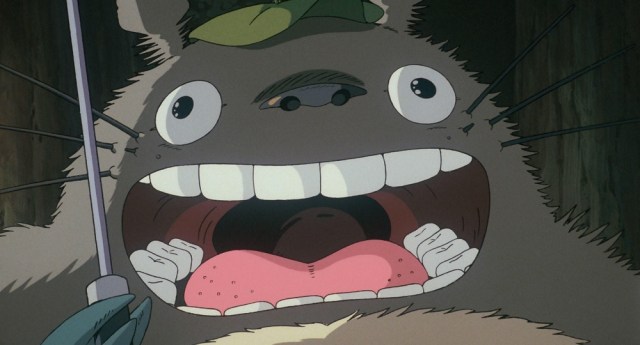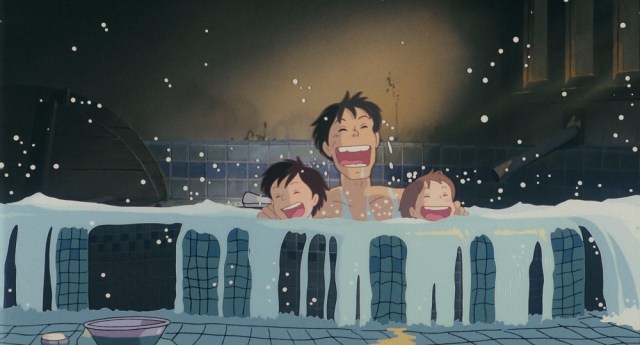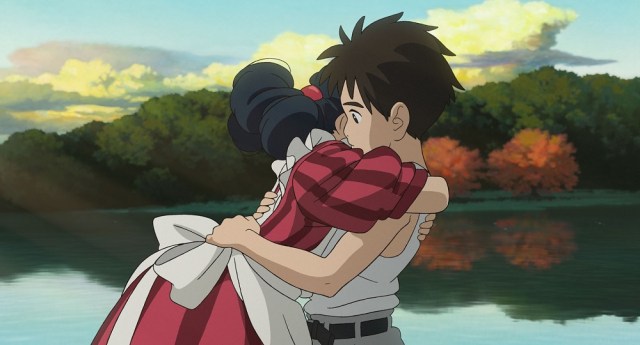
Independent era comes to an end for Hayao Miyazaki’s studio, but it could be the start of a happy future.
For nearly two decades, Studio Ghibli has been an independent company. Originally founded in 1985 with the support of Japanese publishing giant Tokuma Shoten, Ghibli has been independent since 2005, during which it’s released eight anime films, including this summer’s The Boy and the Heron.
As of next month, though, Ghibli’s independent era will be coming to a close, and the studio will become a subsidiary of television broadcaster Nippon TV through a stock acquisition by Nippon Television Holdings, Inc.
This is not, however, a hostile takeover. In a statement posted by Ghibli on its website discussing the deal, the studio says that “As director Hayao Miyazaki is 82 years old, and producer Toshio Suzuki is 75, we have been worrying about the question of who will succeed them [as leaders of the company] for a very long time.” Goro Miyazaki, Hayao’s son, has often been speculated as a possible candidate to take over as head of the company should his father retire, but according to the statement Goro himself has said “It would be difficult for me, as just one person, to take on all of Ghibli’s responsibilities, so we should do otherwise in terms of who to entrust the company’s future to.” It’s an opinion that Suzuki seconds, saying “Ghibli has become something that’s too big for one person to shoulder. I think that we need the support of not an individual, but a large company to run things well.”
In his customarily traditional Japanese way of doing things, Suzuki floated the idea of acquiring Ghibli to Nippon TV while soaking in a hot spring bath with Nippon TV chairman Yoshikuni Sugiyama sometime last year. “Would it be possible for Ghibli to have Nippon TV help with our management and operations, so that we can focus on movie making?” asked Suzuki, to which Sugiyama replied that his company was eager to “support Ghibli’s works and protect their movie-making environment.”
As alluded to in Suzuki’s hot spring question, the acquisition, which is scheduled to take place on October 6, doesn’t mean that Ghibli is closing up shop. Though Nippon TV will become the largest Studio Ghibli shareholder and control 42.3 percent of the studio’s corporate voting rights, Ghibli’s statement asserts “Nippon TV respects the autonomy of Studio Ghibli, and following [the stock acquisition] Studio Ghibli will focus on animated movie production, as well as the operations of the Ghibli Museum and Ghibli Park.”
The stock acquisition doesn’t mean the Hayao Miyazaki is being swept out, either. Following the deal, Ghibli will have and eight-person board of directors, with Hayao Miyazaki in a position of director and honorary chairman, Toshio Suzuki as representative director and chairman, and Goto Suzuki as managing director. Hiroyuki Fukuda, one of three Nippon TB executives who will be placed on the board, will be the company’s president, and at least one of the remaining two board seats will be filled by an auditor.
Also reassuring is the fact that Studio Ghibli and Nippon TV have had an amicable working relationship for decades. When Nausicaä of the Valley of the Wind made its TV broadcast debut in 1985, it was on Nippon TV, and the station has continued to show Ghibli anime multiple times a year as part of its weekly Friday Roadshow cinema program. This summer the two companies also collaborated on the travelling Friday Road Show and Ghibli Exhibition art exhibit.
While Ghibli losing its independent status is likely to rub some fans the wrong way, the acquisition is, in all likelihood, the best possible scenario for the studio moving forward. The immense combined talents of Hayao Miyazaki and Toshio Suzuki, plus their virtually inexhaustible creative energy, are a double-edged sword. So many of Ghibli’s movies come out so good because of how many aspects Miyazaki and Suzuki themselves personally handle, but that also means that the studio doesn’t really have a crop of younger talent that’s coming up and taking on increasingly bigger project roles. Once Miyazaki’s and Suzuki’s anime-making days really are done, the question of who’s going to pick up where they left off isn’t one that Ghibli itself has an internal answer for, especially with Goro Miyazaki seeming to have much greater passion and aptitude for running Ghibli’s museum and theme park than directing anime movies.
So here’s hoping that the deal does just what both parties are saying it’s meant to do, and allows Ghibli to continue making anime free of worry, especially since Hayao Miyazaki still has ideas for another movie.
Source: Studio Ghibli, Nihon Keizai Shimbun, Livedoor News/Reuters
Top image: Studio Ghibli
Insert images: Studio Ghibli (1, 2)
● Want to hear about SoraNews24’s latest articles as soon as they’re published? Follow us on Facebook and Twitter!



 Hayao Miyazaki is getting worried about how his new anime is being marketed, Ghibli producer says
Hayao Miyazaki is getting worried about how his new anime is being marketed, Ghibli producer says New Ghibli art exhibit lets you step into the studio’s anime posters. Sea of Corruption【Photos】
New Ghibli art exhibit lets you step into the studio’s anime posters. Sea of Corruption【Photos】 Now’s your chance to ask Studio Ghibli ANYTHING you want about Princess Mononoke
Now’s your chance to ask Studio Ghibli ANYTHING you want about Princess Mononoke Ghibli Park: Opening date, first photos, and a new promo video produced by Studio Ghibli!
Ghibli Park: Opening date, first photos, and a new promo video produced by Studio Ghibli! The first images of Studio Ghibli’s first-ever CG anime are here!【Photos】
The first images of Studio Ghibli’s first-ever CG anime are here!【Photos】 Seaside scenery, history, and so many desserts on Yokohama’s Akai Kutsu【Japan Loop Buses】
Seaside scenery, history, and so many desserts on Yokohama’s Akai Kutsu【Japan Loop Buses】 Mikado Coffee is a 76-year-old coffee chain with a major celebrity connection
Mikado Coffee is a 76-year-old coffee chain with a major celebrity connection Sandwiches fit for a sumo served up in Osaka【Taste Test】
Sandwiches fit for a sumo served up in Osaka【Taste Test】 Do Hi-Chew-flavor Hi-Chews have a reason to exist?【Taste test】
Do Hi-Chew-flavor Hi-Chews have a reason to exist?【Taste test】 Japan’s summertime towelket pillowcases are even better with the addition of Ghibli stars【Photos】
Japan’s summertime towelket pillowcases are even better with the addition of Ghibli stars【Photos】 Foreigner’s request for help in Tokyo makes us sad for the state of society
Foreigner’s request for help in Tokyo makes us sad for the state of society McDonald’s new Happy Meals offer up cute and practical Sanrio lifestyle goods
McDonald’s new Happy Meals offer up cute and practical Sanrio lifestyle goods Should you add tartar sauce to Japanese curry rice? CoCo Ichi makes diners an unusual offer
Should you add tartar sauce to Japanese curry rice? CoCo Ichi makes diners an unusual offer All-you-can-eat sashimi from Tokyo’s fish market, convenient location make this budget hotel great
All-you-can-eat sashimi from Tokyo’s fish market, convenient location make this budget hotel great Studio Ghibli unveils Mother’s Day gift set that captures the love in My Neighbour Totoro
Studio Ghibli unveils Mother’s Day gift set that captures the love in My Neighbour Totoro Japanese ramen restaurants under pressure from new yen banknotes
Japanese ramen restaurants under pressure from new yen banknotes French Fries Bread in Tokyo’s Shibuya becomes a hit on social media
French Fries Bread in Tokyo’s Shibuya becomes a hit on social media Studio Ghibli releases new action figures featuring Nausicaä of the Valley of the Wind characters
Studio Ghibli releases new action figures featuring Nausicaä of the Valley of the Wind characters Red light district sushi restaurant in Tokyo shows us just how wrong we were about it
Red light district sushi restaurant in Tokyo shows us just how wrong we were about it New private rooms on Tokaido Shinkansen change the way we travel from Tokyo to Kyoto
New private rooms on Tokaido Shinkansen change the way we travel from Tokyo to Kyoto Tokyo Tsukiji fish market site to be redeveloped with 50,000-seat stadium, hotel, shopping center
Tokyo Tsukiji fish market site to be redeveloped with 50,000-seat stadium, hotel, shopping center Beautiful Ghibli sealing wax kits let you create accessories and elegant letter decorations【Pics】
Beautiful Ghibli sealing wax kits let you create accessories and elegant letter decorations【Pics】 Japanese city loses residents’ personal data, which was on paper being transported on a windy day
Japanese city loses residents’ personal data, which was on paper being transported on a windy day Studio Ghibli releases Kiki’s Delivery Service chocolate cake pouches in Japan
Studio Ghibli releases Kiki’s Delivery Service chocolate cake pouches in Japan New definition of “Japanese whiskey” goes into effect to prevent fakes from fooling overseas buyers
New definition of “Japanese whiskey” goes into effect to prevent fakes from fooling overseas buyers Our Japanese reporter visits Costco in the U.S., finds super American and very Japanese things
Our Japanese reporter visits Costco in the U.S., finds super American and very Japanese things All-you-can-drink Starbucks and amazing views part of Tokyo’s new 170 meter-high sky lounge
All-you-can-drink Starbucks and amazing views part of Tokyo’s new 170 meter-high sky lounge More foreign tourists than ever before in history visited Japan last month
More foreign tourists than ever before in history visited Japan last month New Pokémon cakes let you eat your way through Pikachu and all the Eevee evolutions
New Pokémon cakes let you eat your way through Pikachu and all the Eevee evolutions Disney princesses get official manga makeovers for Manga Princess Cafe opening in Tokyo
Disney princesses get official manga makeovers for Manga Princess Cafe opening in Tokyo Sales of Japan’s most convenient train ticket/shopping payment cards suspended indefinitely
Sales of Japan’s most convenient train ticket/shopping payment cards suspended indefinitely Sold-out Studio Ghibli desktop humidifiers are back so Totoro can help you through the dry season
Sold-out Studio Ghibli desktop humidifiers are back so Totoro can help you through the dry season Japanese government to make first change to romanization spelling rules since the 1950s
Japanese government to make first change to romanization spelling rules since the 1950s Ghibli founders Toshio Suzuki and Hayao Miyazaki contribute to Japanese whisky Totoro label design
Ghibli founders Toshio Suzuki and Hayao Miyazaki contribute to Japanese whisky Totoro label design Doraemon found buried at sea as scene from 1993 anime becomes real life【Photos】
Doraemon found buried at sea as scene from 1993 anime becomes real life【Photos】 Tokyo’s most famous Starbucks is closed
Tokyo’s most famous Starbucks is closed One Piece characters’ nationalities revealed, but fans have mixed opinions
One Piece characters’ nationalities revealed, but fans have mixed opinions We asked a Uniqlo employee what four things we should buy and their suggestions didn’t disappoint
We asked a Uniqlo employee what four things we should buy and their suggestions didn’t disappoint Princesses, fruits, and blacksmiths: Study reveals the 30 most unusual family names in Japan
Princesses, fruits, and blacksmiths: Study reveals the 30 most unusual family names in Japan Producer clarifies Studio Ghibli’s future, mentions that Miyazaki “would like to make an anime”
Producer clarifies Studio Ghibli’s future, mentions that Miyazaki “would like to make an anime” Studio Ghibli producer dishes the dirt on Hayao Miyazaki, Your Name, and their next big project
Studio Ghibli producer dishes the dirt on Hayao Miyazaki, Your Name, and their next big project Studio Ghibli offers special Spirited Away present with Toshio Suzuki exhibition tickets in Tokyo
Studio Ghibli offers special Spirited Away present with Toshio Suzuki exhibition tickets in Tokyo “Selfish” Studio Ghibli producer apologizes while announcing price reduction for art exhibit
“Selfish” Studio Ghibli producer apologizes while announcing price reduction for art exhibit Beardless Hayao Miyazaki has on-brand answer to what he likes about The Boy and the Heron【Video】
Beardless Hayao Miyazaki has on-brand answer to what he likes about The Boy and the Heron【Video】 “I didn’t ask the old men for any advice” says director of Studio Ghibli’s first CG anime
“I didn’t ask the old men for any advice” says director of Studio Ghibli’s first CG anime Hayao Miyazaki makes rare video appearance to check out Ghibli Museum’s revamped cafe【Video】
Hayao Miyazaki makes rare video appearance to check out Ghibli Museum’s revamped cafe【Video】 Totoro beer? Hayao Miyazaki draws new version of anime icon for Japanese craft beer label
Totoro beer? Hayao Miyazaki draws new version of anime icon for Japanese craft beer label “Let’s leave it to Goro” – The moment Hayao Miyazaki was truly convinced about Ghibli theme park
“Let’s leave it to Goro” – The moment Hayao Miyazaki was truly convinced about Ghibli theme park Studio Ghibli co-founder Toshio Suzuki receives lifetime achievement honor at Annie awards
Studio Ghibli co-founder Toshio Suzuki receives lifetime achievement honor at Annie awards Hayao Miyazaki Working on Proposed New Anime Feature Film
Hayao Miyazaki Working on Proposed New Anime Feature Film Hayao Miyazaki’s Studio Ghibli anime are finally coming to streaming with HBO Max deal
Hayao Miyazaki’s Studio Ghibli anime are finally coming to streaming with HBO Max deal Evangelion creator Hideaki Anno wants to make a live-action Nausicaä of the Valley of the Wind
Evangelion creator Hideaki Anno wants to make a live-action Nausicaä of the Valley of the Wind Hayao Miyazaki has no idea that his anime keeps setting Twitter records, Ghibli producer says
Hayao Miyazaki has no idea that his anime keeps setting Twitter records, Ghibli producer says Hayao Miyazaki still looking for talented staff to join Studio Ghibli for new anime production
Hayao Miyazaki still looking for talented staff to join Studio Ghibli for new anime production
Leave a Reply